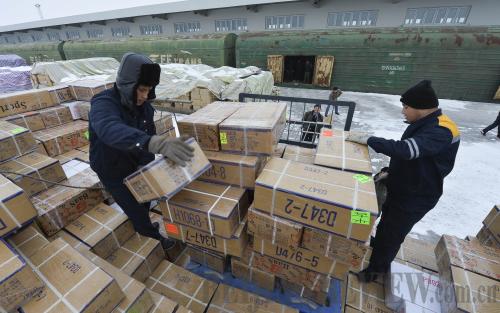|
 |
|
TRADE BOOM: Workers load goods bound for Kazakhstan in Horgos, northwest China's Xinjiang Uygur Autonomous Region, along the China-Kazakhstan border on December 25, 2013 (JIANG WENYAO) |
For the video please click here

China's proposal to build a New Silk Road Economic Belt is poised to spearhead positive change in Central Asia and beyond. In a recent interview with a Beijing Review reporter, Helga Zepp-LaRouche, founder and President of the Schiller Institute, an economic and political think tank headquartered in the United States and Germany, shared her thoughts on the ambitious multinational plan. Excerpts follow:
Beijing Review: What are your opinions regarding the New Silk Road Economic Belt as a blueprint for regional cooperation?
Helga Zepp-LaRouche: I'm very happy about it because it will transform this region of the world in a positive way and it will increase the living standard of the population there.
There is a general recognition in the world that the New Silk Road is only the beginning of a much larger integration of the world economy. We are very happy about this initiative because it will be the beginning of a complete new epoch of civilization.
The Central Asian region has undergone major security and economic pressures due to threats such as terrorism in recent decades. In what ways will the establishment of the New Silk Road Economic Belt affect change in the area?
Drug production in Afghanistan has increased 40 times since NATO moved in there 13 years ago. The profit from that drug production has become the financial support of terrorism. I think there must be international cooperation among all neighboring countries of Afghanistan, i.e. China, Russia, India, Iran and hopefully others, to wipe out the drug traffic. The drug traffic problem has become a major security problem for Russia—hundreds of thousands of people die every year as a result of drug smuggling from Afghanistan. It has become a big security problem for China, because one of the drug routes goes through Xinjiang. It is also feeding terrorists in Tajikistan, Russia's Chechnya, Pakistan and the whole region from Afghanistan all the way to Syria, North Africa and even Central Africa. This has become a major source of threat to the stability of the region.
There must be international efforts to stabilize this region. That is why we have been proposing a very concrete extension of the Eurasian Land Bridge to the whole region, and even to Afghanistan, Syria and North Africa. You have to give incentive to the population and let them see the economic cooperation that gives them the chance to have a better future. There is better incentive than to go to drug production, or to support terrorism, which many people do because it's being paid. Many people are just poor. You have to change the entire region with an economic development prospect which can only come from the New Silk Road Economic Belt.
How will the overall geopolitical situation in Central Asia change with such an economic belt? What would be the implications for the international community?
I think we are now at a moment of history where the old geopolitical thinking is not functioning anymore. Right now we see an immediate war danger coming out of the development of Ukraine. You have to see the effort to pick Ukraine away from Russia in connection to the U.S. defense systems in Poland, Romania and the Aegis destroyer sent to Spain, which shows the first-strike doctrine. The Russians have said very clearly that they will not accept this U.S. missile defense system being built in the third or the fourth phase, because it's aimed to take out the second-strike capability of Russia. There is a similar Utopian policy against China in the form of the air-sea battle doctrine in the Pacific which has the illusion that you can basically disarm China without China being able to defend itself, which China has clearly refuted.
If you look at the whole situation, we are on the road to World War III. That is our absolute conviction and it has everything to do with the fact that the West European and U.S. financial system is about to blow out, and the Pacific countries are prospering. Now the collapse of the financial system will happen. It can be saved if you get rid of the casino aspect of economy. It is fortunate that not all people are going for this war escalation.
The countries in Central Asia will be confronted with: Do they want to join the only available solution, which is the New Silk Road? The normal thinking is ethnic and historical tensions will all be superseded by the big issue of the financial collapse and the danger of World War III. We need to change the paradigm quickly and abandon the idea of solving problems through war, and stop thinking in terms of geopolitics. We must focus on the common aims of mankind or we all may not exist.
We have 2 billion people starving every day. Many of those are in Africa but also in other developing countries. We are in a breakdown crisis. If there is any future for mankind, we have to go to a completely different way of cooperating in our mutually beneficial interests. I think the Eurasian Land Bridge or the New Silk Road has the idea of improving the living standard in all the landlocked areas of Eurasia. It is a new phase of evolution because as we look at the first people many thousand years ago, they settled at the oceans and then the river systems. It took quite some development for people to conquer the landlocked areas through roads and channels between the rivers, and this process has not yet been completed.
In Eurasia we have many landlocked areas which are not easily accessible because they are not yet developed from the standpoint of waterways or railways, as there are only dirt roads. So we have to do a lot of work in the next 20-50 years. I think the key thing is to get a change in the thinking of the responsible people before it's too late.
Emerging economies, particularly the BRICS member countries, have been the engine of the global economy for the past few years. But some economists pointed out that the development of emerging economies has slowed down due to the global economic crisis, predicting these economies would be unable to sustain their growth. Do you agree with them?
It depends. If you stay within the system of globalization, then the future will not look so great because the system is collapsing right now. There are people even in the United States like Vice Chairman of the Federal Deposit Insurance Corp. Thomas Hoenig, who made the argument that the financial system is so bankrupt that if one or two of the too-big-to-fail banks go bankrupt, it will bring down the whole system because of the connection of the market segments.
The derivatives have created a situation where once a major bank like the Lehman Brothers collapses, then the whole system could evaporate immediately. Some people even talk about the system collapsing like a supernova, a star dying. That is why it is so super urgent that we go to a different system and stop thinking about high profits like speculation and money making money—the whole crazy ideology that has developed during the last 50 years. We have to go back to the idea of focusing on the real economy.
The idea of the New Silk Road should not only be extended to Central Asia, but be made the concept of improving the living condition of the entire planet. That means the emerging economies will have a very bright future, as they become part of the Silk Road and join in the development. If they succeed in putting that on their agenda, I think we are at the beginning of a very promising new epoch.
Unlike the New Silk Road, the Trans-Pacific Partnership (TPP) for Asia and the Transatlantic Trade and Investment Partnership (TTIP) for the transatlantic world will really go one more step in the direction of a world empire, whereby the 500 largest corporations would have all the power, and the power of civilian governments will be diminished. We should oppose this conception because it does not serve the well-being of the population, but it does serve the profits of the CEOs of the 500 largest firms. The latest statistics show that the world's 85 richest people hold as much wealth as the poorest 3.5 billion, or half of world population. Why should 85 people have the fortune of half of mankind? The TPP and the TTIP would escalate that even more. It will just lead to mass starvation and mass poverty, which are already getting bigger and bigger. Therefore the need for reform is very, very urgent.
Email us at: dingying@bjreview.com | 